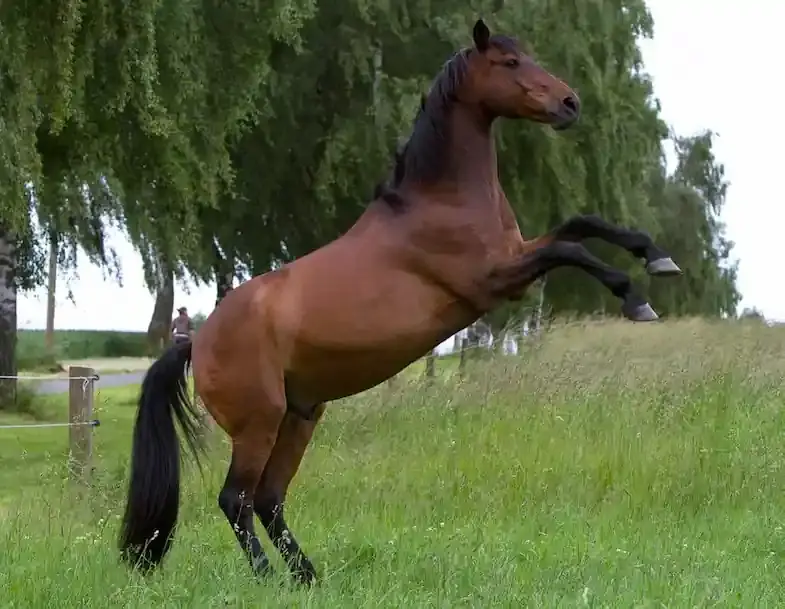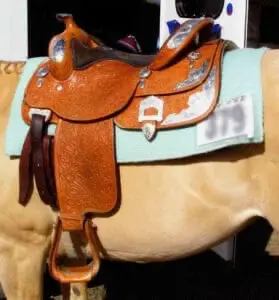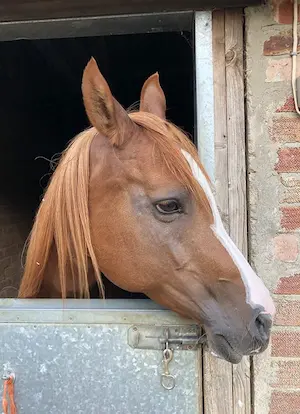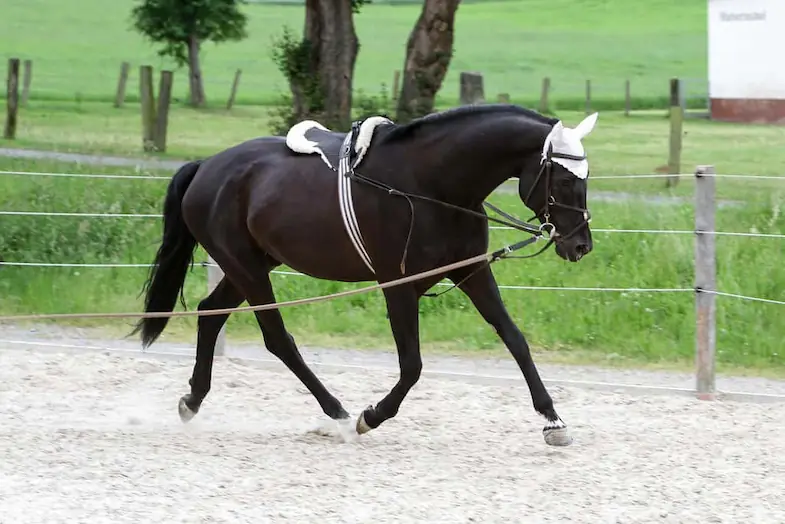Riding a horse that’s rearing can be a frightening experience and one that many horse riders fear, understandably. While it’s a problem that, hopefully, most of us will never have to deal with, if your horse is rearing it can be difficult to know what to do and how to stop them doing it again. This is why I decided to write this article, I’ve worked with a few ‘rearers’ and have found that, while there can be a number of causes, there’s a simple solution to breaking the habit.
The main reasons why horses rear are fear, pain, confusion, or behavioral. They can’t tell us they’re uncomfortable going forward and see rearing as the only way they can escape the situation. Of course, some horses will also use rearing as a way of asserting their dominance over other horses.
There’s a lot of misunderstanding about what rearing actually means, most people think that when a horse stands upright on his hind legs this is rearing. While this of course is true a horse’s front legs don’t need to leave the ground for the horse to rear. The very first time your horse rears you may not even notice it, his feet will probably not leave the ground but instead, he’ll hesitate for a second and you’ll feel his weight shift towards his haunches. He’ll probably then move off without any issues but while it’s technically not rear it is the start of one. In an ideal world, this would be when you start to address the problem but in most cases, this attempt at rearing will pass without you noticing it. Regardless of whether or not you address the problem at this stage the method for preventing is still the same.

Why is my horse rearing?
You can’t begin to stop your horse from rearing until you fully understand why he started doing it in the first place. Horses rarely rear because they’re being naughty or just misbehaving, there’s usually always an underlying reason for it and it’s essential to address that before you can even begin to eliminate the behavior.
Is pain causing your horse to rear?
Pain is probably the single biggest reason for horses rearing, it’s also one of the easiest causes to stop as well.
Saddle – Poorly fitting saddles are a common cause of horses rearing, if the saddle is too big it can sit on the horse’s spine and lead to pressure points but if it’s too small then it can pinch his shoulder blades. If you’re not 100% sure your horse’s saddle is right have a qualified saddle fitter check it for you, doing so can prevent a lot of problems for both you and your horse.
Bit – If you have a soft bit that isn’t the right size for your horse or isn’t fitted properly it can cause just as much pain as a harsh bit and can lead to your horse rearing in an attempt to get away from the pressure. As a rule, you should always use the softest bit you can but it’s crucial it’s the right size.
Cinch or girth – We often overlook the cinch or girth when checking our horse’s tack but if it’s not fitted properly or is too tight it can pinch your horse and create a lot of unnecessary discomfort. A correctly fitted cinch or girth should sit in a horse’s natural girth groove and come straight down from the saddle. If it’s tightened correctly you should be able to get your index finger between it and your horse – more means it’s too loose while less means it’s too tight.
Pulling too tight on the reins – This is more common with inexperienced or nervous riders but if you’re pulling on the reins all of the time it forces your horse’s head upwards. While you might not realize it, this upwards movement is actually the start of a rear, and while it may not be your horse’s intention at first it can lead to rearing. If you have a tendency to pull on the reins then try riding with a neck strap and hold onto that or consider riding lessons to help you relax in the saddle.
Dental issues – Just as is the case with a badly fitted or harsh bit, problems with your horse’s teeth can cause him to rear. He’s trying to escape from the pain or discomfort in his mouth and upward, to him at least, seems the logical place to go. Have your veterinarian or an equine dentist check your horse’s teeth over for any problems.
Health issues – If your horse is rearing you should always have your veterinarian check him over for any physical reasons. Horses can’t tell us when they’re in pain so resort to behaviors such as rearing or bucking in an attempt to get away from the source of their discomfort which is why you should have your veterinarian check your horse over. He’ll be able to tell you if there’s a medical reason for his behavior and will also be able to help you deal with it.
Is your horse rearing because of fear?
If a horse is faced with something that frightens them their natural instinct is to get away from the situation as quickly as possible but while this can, in most cases, cause the horse to run, if they feel cornered they’re far more likely to rear instead.
Eyesight – Despite not seeing the world the same way we do and having a limited color range horses do in fact have very good eyesight and rely on this to help them survive. If your horse is suffering from a cataract or has injured his eye (or eyes) then he may not be able to see so well. While horses with poor eyesight might not be that worried moving around the yard, in unfamiliar surroundings this lack of vision can panic them and ultimately cause them to rear. Ask your veterinarian to check your horse’s eyes to make sure he can see clearly. If your horse does have problems with his eyesight then take this into consideration when planning your ride and try to avoid strange places if you can.
Fear / Anxiety – Horses that are frightened will often become very anxious and can act completely out of character. The rational side of their brain stops working and their instinct kicks in, 9 times out of 10 this instinct is telling your horse to get out of there as quickly as he can and rearing is his way of doing this. If this is the case with your horse try and keep him as calm as you can, you can do this by talking to him constantly in a soft voice. This will help to reassure him, if you’re relaxed he’ll be too. If your horse is a particularly nervy horse then you can also rub a tiny little bit of lavender oil onto the bridle. The scent from the lavender will help to reduce your horse’s stress.
Confusion can cause horses to rear
Horses naturally want to do what we ask them to do but if you’re not clear then this can lead to confusion, which in turn, can cause frustration. Sadly this frustration can result in a horse rearing because it just doesn’t understand and wants to escape and get away from the source of the confusion.
Poor training – Horses are intelligent animals and want to please us but if they’ve not been trained properly they don’t always understand what’s required of them. This can lead to confusion and frustration and can, in extreme cases, cause your horse to become overwhelmed by the task at hand. This is likely to result in him rearing because he just doesn’t know what to do and wants to leave the situation. If there are gaps in your horse’s training then consider working with an instructor or trainer to overcome this.
Mixed messages – If you’re kicking your horse forward while also pulling on the reins you’re going to be confusing him. He won’t know if you want him to stop or move forward which will frustrate him, this frustration can lead to rearing simply because he just won’t know what to do.
Behavioral issues can be a cause for horses rearing
If you’ve eliminated all other reasons for your horse rearing then the only other cause for it is their behavior.
Disobedience – Some horses will use rearing as an excuse to get out of something they don’t want to do. Every time he does this and it works it reinforces the behavior which can make it harder to break. While it can be difficult to carry on with what you’re doing after your horse has reared it’s important to do so as soon as possible. If you’re not confident yourself then speak to your instructor and ask them to help you.
Boredom – Horses that are cooped up all day with nothing to do and nothing to occupy them can become extremely bored and may turn to rearing out of sheer boredom. This can easily be prevented though by making sure your horse has something to keep his mind active, whether it’s a slow feeder, a mirror (so they can interact with ‘another’ horse), or a horse toy. It doesn’t matter how you keep your horse occupied the main thing is you do.
Too much energy – If your horse is stabled all day long and has too much grain in his diet then he probably has a lot of excess energy that he’ll need to get rid of. One way he may let off steam is to rear as soon as you start riding. To stop this make sure you’re not overfeeding your horse high-energy foods and that he has the appropriate amount for his workload. Turning him out regularly will also help to dispel some of this energy as he can exercise while he’s in the field.
Dominance – This is more common in stallions but some horses will rear as a way of making themselves look more threatening and therefore dominant. They can do this when they don’t want to do something or are simply in a bad mood. This, thankfully though, is pretty rare and as I say more common in stallions (especially when there’s a mare on heat around) but if your horse is doing this it may be time to bring a qualified trainer in to help.
How can you tell when your horse is going to rear?
Some horses will inadvertently give you notice that they’re thinking about rearing, this can be as subtle as they shorten their stride and twitch their ears or it can be as obvious as resisting you or suddenly come to a halt and lower their hunches. All horses are different and you know your horse better than anybody so pay attention to the signs he’s giving you.
If your horse does give you a sign that he’s going to rear then, if possible, you need to keep him moving forward and bring his attention back to you again. Horses have to be stationary in order to rear so if you’re moving forward then he won’t be able to rear, even if he wants to.
Regardless of whether or not your horse gives you any warning horses will generally follow the same cause of action when they rear. The first thing they’ll do is stop and tense their body, they’ll then raise their front legs off of the ground and stand on their hind legs. Some horses will also kick out with their front legs before lowering them and returning back to the ground.
What should you do when your horse rears?
It can be frightening if your horse rears while you’re riding but if you’re able to (and it’s safe to do so) you should try and stay on the horse. Jumping off can sometimes encourage your horse to do it again, there’s always the risk he’ll learn that if he rears you jump off and he, therefore, can get out of being ridden.
The most important thing to remember when your horse rears is DON’T pull you the reins, you might think that this will help you stay on but it’ll actually do the opposite. Pulling back on the reins will force your horse to raise his head more than he intended to which will put him off of balance, this lack of balance could cause your horse to fall backward. Instead, relax your contact with the reins and hold onto your horse’s neck or mane, or the saddle or neck strap if you need to you.
When your horse rears you’ll need to adjust your balance to help your horse keep his, you can do this by keeping your weight forward and centered while at the same time leaning into his neck. The closer you can get to your horse the better but as soon as he starts to come back down you’ll need to straighten up again.
If you don’t feel it’s safe to stay on your horse then an emergency dismount is the best option, this is where you remove your feet from the stirrups (and move the reins out of the way) before dismounting from either said in a quick swinging movement. Sometimes though there just isn’t enough time for this and you find your horse already in the air with you clinging onto his neck. If this is the case and you still feel you’ll be safer on the ground, remove your feet from the stirrups and slide off of the horse’s back before quickly moving away to safety.
How to protect yourself when your horse rears.
Less than 0.01% of horses that rear in the field will fall but this number rises sharply when a rider is involved, in part because they pull on the reins but also because the horse hasn’t taken the rider’s weight into account. This increased risk means that there is a chance the rider could be injured too, especially if they aren’t able to move out of the way before the horse falls.
This means that we need to do everything we can to protect ourselves and, why we all have our own options on whether riding helmets and body protectors are ‘cool’ you can’t argue with the facts. And the facts clearly show that if you’re wearing the right protective gear you can greatly reduce your risk of serious injury.
Wearing a riding helmet that conforms to the latest safety standards can reduce your risk of serious injury (and even death) by around 60% whereas wearing a body protector will help to keep your back and internal organs safer if the horse should fall on you. When you consider this I really don’t understand why people don’t wear them all the time!
How do you stop a horse from rearing?
Thankfully most horses will stop rearing as soon as you remove the reason they started in the first place, but that said if you don’t deal with the reason quickly it can develop into a habit. Once rearing has become a habit it can be harder to stop your horse doing it, luckily though it’s not impossible, it just takes longer.
When it comes to training your horse to not rear, one of the most important things to do, if you can, is to ride the rear out and continue as if nothing has happened. This will signal to your horse that he can’t rear to avoid doing something but it’ll also tell him that it’s not acceptable behavior.
Any instructor or trainer will continually say how good groundwork is at correcting many behavioral problems and rearing is by no means an exception. Groundwork will help to improve your horse’s responsiveness to you and your commands but it will also teach him to respect you and improve his confidence. It can also work towards reducing your horse’s anxiety and fear which is another reason why it’s so good for stopping horses rearing. I recently wrote two articles about the importance of groundwork that you might find helpful, one on improving suppleness and the other on bonding.
In summary, the route to preventing your horse rearing is – to deal with the problem – ride the rear out – focus on groundwork. Follow these three things and in time your horse will stop rearing. If however, you don’t feel confident or aren’t experienced enough then you’re better off working with a qualified instructor or trainer.
Should you buy a horse that rears?
It can be really difficult if you’ve got your heart set on a particular horse but if the horse rears you should walk away and look for another horse instead, no matter how perfect the horse may think it is. I know that may sound harsh but unless you know why the horse is rearing (and that you can 100% for sure you can stop it) you should consider it a deal-breaker.
Related questions
Why do horses rear in the wild?
Most wild horses normally only rear when they’re frightened or when they’re trying to assert their dominance in the herd. Stallions also rear when they’re trying to win the approval of a mare or fight off a rival stallion.
Will a tie-down stop my horse rearing?
Using a tie-down (or martingale) to stop your horse rearing will, if anything, make it worse. By using a tie-down you’re restraining his head which will more than likely have the opposite effect because he’ll instinctively want to pull away from the tension.
Further reading
- Improving your horse’s confidence
- Beating stall rest blues
- How to calm a nervous horse
- Why do horses windsuck?
- How to successfully load a horse
- Do horses need shoes?
- When should you retire your horse?
- Are treeless saddles again
- How to handle an aggressive horse
- Why punishing horses doesn’t work
I hope you found this article helpful. If you did I’d be grateful if you could share it please as it would really help me.
Recommended products
Over the years I have tried hundreds of different horsey products, from various blankets and halters to different treats. Some I’ve loved, others I’ve hated but I thought I’d share with you my top all-time favorite products, the ones I never leave the yard without. I’ve included links to the products (which are in no particular order) that I really think are great.
- Horse Knots by Reference Ready – If you’re like me and enjoy pocket reference guides then you’ll love this knot tying guide. These handy cards can easily fit in your pocket or attach to the saddle for quick reference. They’re waterproof, durable and are color coded to make them easy to follow.
- Mane ’n Tail Detangler – Even if you never show your horse you’ll need to detangle his tail from time to time (and possibly his mane too) which is always a challenging chore! I’ve found that if I run a little bit of detangler through my horse’s tails every few days it stops them from getting matted up and makes combing them easy, even if they’re coated in mud. I don’t know if I should admit to this or not but it also works wonders on my hair.
- TAKEKIT Pro clippers – Over the years I’ve tried a lot of different clippers and while some were obviously better than others I found these to be by far the best. They are heavier than a lot of other clippers but for me, that’s a good thing, it makes them feel more sturdy and hardwearing. On top of that they have a range of speeds so are just as good for clipping your horse’s back as they are his face. I also like the fact that they come in a handy carry case but that’s not for everybody. The company that makes them is super good and incredibly helpful too, a real bonus these days. The only thing I wasn’t keen on was the fact that it doesn’t come with any oil, but that’s not a major problem as it’s not difficult to buy lubricant.
- Shire’s ball feeder – There are so many boredom buster toys out there but I like to use these every day, regardless of whether or not my horses are bored. I find that it helps to encourage my horses to problem solve by rewarding them with treats (or pieces of fruit) but it also mimics their natural grazing behavior which helps to keep them calm and de-stressed.
- Horse safe mirror – This is a strange one that many people are surprised about but I like to put horse safe mirrors in the trailers as well as in the quarantine stalls. It helps to prevent the feeling of isolation by giving the impression of other horses being around. Being herd animals horses can get extremely stressed when they feel that they’re on their own but with these stick-on mirrors, they believe that at least one other horse is with them.
- Rectal thermometer – I know this isn’t glamourous at all but it’s vital for your horse’s well-being to be able to check their temperature and a rectal thermometer is the easiest way of doing this which is why I’ve added it to the list.
Shopping lists
I’ve also put together a few shopping lists of essential items that I’ve found helpful over the years. I’ve broken the lists down into different categories rather than put everything in one massive list 😉





